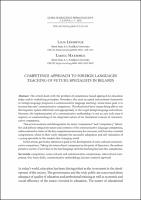COMPETENCE APPROACH TO FOREIGN LANGUAGES TEACHING OF FUTURE SPECIALISTS IN BELARUS
Аннотации
The article deals with the problem of competence-based approach to education
today and its underlying principles. Nowadays, the most accepted instructional framework
in foreign language programs is communicative language teaching, whose main goal is to
increase learners’ communicative competence. This theoretical term means being able to use
the linguistic system effectively and appropriately in the target foreign language and culture.
However, the implementation of a communicative methodology is not an easy task since it
requires an understanding of the integrated nature of the theoretical concept of communicative
competence.
This article analyses and distinguishes the terms “competence” and “competency”, identifies
and defines integral structure and contents of the communicative language competence,
substantiates the choice of the key competences necessary for everyone, and function-oriented
competences, which in their unity stipulate the successful adaptation and self-realization of
a young specialist in the modern fast-changing world.
In the article, particular attention is paid to the development of cross-cultural communicative
competence. Taking the intercultural component as the point of departure, the authors
present a variety of activities in the four language skills for teaching learners this competence.
